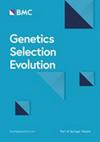对健康幼猪的血液转录组进行遗传分析以提高抗病能力
IF 3.6
1区 农林科学
Q1 AGRICULTURE, DAIRY & ANIMAL SCIENCE
引用次数: 0
摘要
抗病力是指动物在疾病条件下保持生产性能的能力,也是一个重要的选育目标。在猪育种项目中,必须在不使候选猪暴露于疾病的情况下对其抗病能力进行评估。为了确定可用于测量选育候选猪抗病能力的潜在遗传指标,我们重点研究了 1594 头健康幼猪的血液转录组,并随后记录了抗病能力。转录组数据通过 3'mRNA 测序获得,基因型数据来自 650 K 基因分型阵列。估算了 16,545 个基因表达的遗传力,其中 5665 个基因的遗传力估算值显著(p 0.2)。遗传率估计值与人类血液中基因表达的相应估计值的相关性较弱,但有相当数量的基因与遗传表达水平重叠。具有遗传表达水平的基因明显富集于细胞活化、免疫系统过程、应激反应和白细胞活化等生物过程,并涉及各种疾病注释,如 RNA 病毒感染(包括 SARS-Cov2)、肝病和炎症。为了估计与疾病恢复力的遗传相关性,我们对 3205 头基因分型猪(包括 1594 头有转录组数据的猪)暴露于自然多微生物疾病挑战后的疾病恢复力进行了评估。在所有抗病表型中都观察到了显著的遗传相关性(p < 0.05),但很少有超过预期的假发现率。根据基因与恢复力表型相关性的估计值对基因进行的富集分析表明,白细胞介素和干扰素等细胞因子的调控以及伴侣蛋白介导的蛋白质折叠等生物过程具有重要意义。这些结果表明,幼年健康猪血液中与免疫和内质网应激相关的生物通路中基因的表达水平有可能被用作遗传指示性状,以选择抗病能力。本文章由计算机程序翻译,如有差异,请以英文原文为准。
Genetic analysis of the blood transcriptome of young healthy pigs to improve disease resilience
Disease resilience is the ability of an animal to maintain productive performance under disease conditions and is an important selection target. In pig breeding programs, disease resilience must be evaluated on selection candidates without exposing them to disease. To identify potential genetic indicators for disease resilience that can be measured on selection candidates, we focused on the blood transcriptome of 1594 young healthy pigs with subsequent records on disease resilience. Transcriptome data were obtained by 3’mRNA sequencing and genotype data were from a 650 K genotyping array. Heritabilities of the expression of 16,545 genes were estimated, of which 5665 genes showed significant estimates of heritability (p < 0.05), ranging from 0.05 to 0.90, with or without accounting for white blood cell composition. Genes with heritable expression levels were spread across chromosomes, but were enriched in the swine leukocyte antigen region (average estimate > 0.2). The correlation of heritability estimates with the corresponding estimates obtained for genes expressed in human blood was weak but a sizable number of genes with heritable expression levels overlapped. Genes with heritable expression levels were significantly enriched for biological processes such as cell activation, immune system process, stress response, and leukocyte activation, and were involved in various disease annotations such as RNA virus infection, including SARS-Cov2, as well as liver disease, and inflammation. To estimate genetic correlations with disease resilience, 3205 genotyped pigs, including the 1594 pigs with transcriptome data, were evaluated for disease resilience following their exposure to a natural polymicrobial disease challenge. Significant genetic correlations (p < 0.05) were observed with all resilience phenotypes, although few exceeded expected false discovery rates. Enrichment analysis of genes ranked by estimates of genetic correlations with resilience phenotypes revealed significance for biological processes such as regulation of cytokines, including interleukins and interferons, and chaperone mediated protein folding. These results suggest that expression levels in the blood of young healthy pigs for genes in biological pathways related to immunity and endoplasmic reticulum stress have potential to be used as genetic indicator traits to select for disease resilience.
求助全文
通过发布文献求助,成功后即可免费获取论文全文。
去求助
来源期刊

Genetics Selection Evolution
生物-奶制品与动物科学
CiteScore
6.50
自引率
9.80%
发文量
74
审稿时长
1 months
期刊介绍:
Genetics Selection Evolution invites basic, applied and methodological content that will aid the current understanding and the utilization of genetic variability in domestic animal species. Although the focus is on domestic animal species, research on other species is invited if it contributes to the understanding of the use of genetic variability in domestic animals. Genetics Selection Evolution publishes results from all levels of study, from the gene to the quantitative trait, from the individual to the population, the breed or the species. Contributions concerning both the biological approach, from molecular genetics to quantitative genetics, as well as the mathematical approach, from population genetics to statistics, are welcome. Specific areas of interest include but are not limited to: gene and QTL identification, mapping and characterization, analysis of new phenotypes, high-throughput SNP data analysis, functional genomics, cytogenetics, genetic diversity of populations and breeds, genetic evaluation, applied and experimental selection, genomic selection, selection efficiency, and statistical methodology for the genetic analysis of phenotypes with quantitative and mixed inheritance.
 求助内容:
求助内容: 应助结果提醒方式:
应助结果提醒方式:


